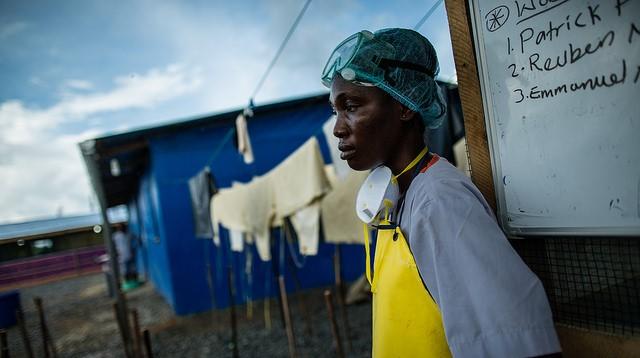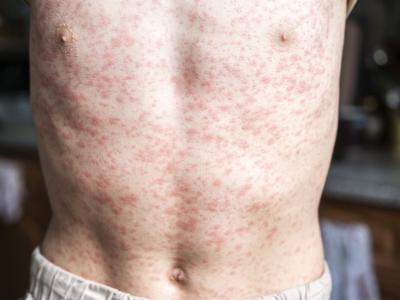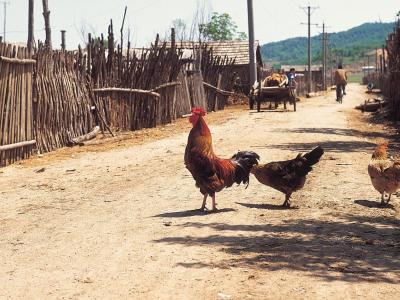A top World Health Organization (WHO) official said today that Ebola activity in Liberia, the hardest hit country, may be slowly beginning to decline, in spite of a large increase in West African cases that raises the outbreak total above 13,000.
Also, new announcements about those returning from the region to the United States continue to roil the debate over mandatory quarantine for asymptomatic people.
Liberia situation
Though data are still murky, reports in Liberia of a few freed-up Ebola treatment unit beds, fewer burials, and other accounts from responders on the ground suggest that an apparent slowing of disease activity there is real, Bruce Aylward, MD, MPH, the WHO's assistant director-general in charge of Ebola outbreak response, said today at a media telebriefing in Geneva.
Though he said he was "cautiously optimistic," he was also "terrified" that his assessment could be misinterpreted to indicate that the global response could be throttled back.
Any improvements in Liberia are likely the result of massive efforts to inform people about the disease and what they can do to reduce their risk as well as stepped-up efforts to provide safe burials, he said. Those steps can take some of the heat out of the epidemic, but classic public health strategies, including contact tracing and isolation, are needed to eliminate chains of transmission, he added. "Those are the strategies that get you to zero."
Aylward said the major gap in the response is still providing enough Ebola treatment units (ETUs), though international groups are making progress. Of 56 units (4,707 beds) needed across the three countries, 15 (1,047 beds) are fully functional and 22 are in the process of being built and staffed. Nineteen more are needed, he said: 14 for Liberia and 5 for Guinea.
As a key tool in curbing the outbreak, the ETUs need to be broadly distributed across the outbreak region with the ability to be scaled up to handle increased demand as needed, he said, alluding to oscillating activity that some areas such as Guinea have seen.
The developments in Liberia provide evidence that Ebola control strategies can work at a scale level, he said, adding that the single biggest mistake would be to not follow through with the ETU goals.
Jump in West African cases
Ebola activity in Sierra Leone continues to increase, led by a surge of cases not in the traditional hot spots where the three countries meet but in the western part of the country that includes the capital city of Freetown, Aylward said.
One bright spot there is the opening of the country's first community care center, in Port Loko, which brings diagnosis, isolation, and care closer to where people live. "The feedback from the community is extremely positive," he said.
The WHO said in its latest outbreak situation update today that the total number of reported cases from Guinea, Liberia, and Sierra Leone was 13,676 as of Oct 27. The number signals an increase of 3,262 cases in those countries and 1,870 in Liberia since the previous WHO update on Oct 24. Aylward said the increase in Liberia includes a bolus of older cases that have recently been entered into the data collection system.
The WHO put the number of deaths in the three countries at 4,910.
Globally, the number of cases is 13,703. Cases for the three hardest-hit countries are 6,535 in Liberia, 5,235 in Sierra Leone, and 1,906 in Guinea, where the outbreak began.
So far Mali, which reported its first case on Oct 23, has had no other suspected or confirmed cases, Aylward said. The sick child, who has since died, and her grandmother took two buses to get from Guinea to their destination in Mali, and so far health authorities have identified and are following 84 contacts.
Military announces quarantine policy
In other developments that add to an expanding checkerboard of quarantine policies for people returning from West Africa's outbreak region, US Department of Defense (DoD) Secretary Chuck Hagel today announced a 21-day monitoring period for US service members returning from countries affected by the outbreak.
He said the policy was discussed by communities and military family members, who said they wanted a "safety valve" in place, according to a DoD press release on the decision.
The 21-day "controlled monitoring" period applies to all US service members returning from Operation United Freedom, the release said. An Associated Press story today referred to the period as a 21-day quarantine.
Defense officials said at a US House committee hearing last week that about 700 US troops were currently deployed in the region, and federal officials have said troops are working on logistics and building projects and don't have contact with Ebola patients.
The press release said Hagel believes the steps are prudent, given the large number of military personnel traveling between their home bases and West Africa and the unique logistical demands and impact of the deployment on the forces. "The secretary's highest priority is the safety and security of our men and women in uniform and their families."
Hagel's order asks the Joint Chiefs of Staff to provide specifics about the program within 15 days and to review the new system within 45 days.
Today's order follows a directive ordered by US Army leaders that all soldiers returning home from Ebola response efforts in West Africa go through a 21-day quarantine. According to recent media reports, the first American troops to leave Liberia are in controlled monitoring at a military installation in Vicenza, Italy.
Hagel's announcement seems to run counter to concerns President Barack Obama raised yesterday about mandatory quarantine policies as posing obstacles and stigma to those serving in the outbreak region. His main concerns were for healthcare workers, who are key resources for isolating and treating patients.
Obama also argued that the mandatory quarantine policies for asymptomatic people seem to be guided by fear rather than science. He was scheduled to meet today with health workers who have returned from or will travel to help in West Africa.
In a White House presentation today that was streamed live on the White House Web site, Obama, flanked by Ebola survivor Kent Brantly, MD, and other Ebola health workers, repeated that the best way to protect Americans is to battle Ebola at its source, with health workers playing a key role. "We need to call them what they are, American heroes," Obama said, adding that they deserve to be treated with dignity and respect.
He said the new Centers for Disease Control and Prevention recommendations on monitoring, released Oct 27, are based on science and tailored to the unique circumstances of healthcare workers. "If we're discouraging healthcare workers from traveling, then we're not doing our job in looking after our own health and safety," he said. "It's critical to remain focused on the facts and the science."
Maine nurse defies quarantine
In a related development, Kari Hickox, the Maine nurse who was quarantined against her will in New Jersey as she returned from an assignment with Doctors Without Borders, said she will take legal action against Maine if it doesn't lift its mandatory quarantine on her by tomorrow, according to an ABC News report.
Hickox has tested negative for Ebola and hasn't had a fever, but one forehead scanner reading taken at the airport several hours after she was detained showed an elevated temperature, which prompted her initial isolation at a New Jersey hospital, which in turn triggered quarantine orders in New Jersey and New York.
Maine Gov. Paul LePage said in a statement that officials are aware that Hickox, who is in the Fort Kent community, intends to defy the order and that the state is seeking legal authority to enforce the quarantine. Police are monitoring the residence where she is staying to protect her and the health of the community, LePage said.
He said Maine lauds health workers for their humanitarian work in West Africa and other parts of the world, and while it respects the rights of one individual, it must be vigilant in protecting the state's residents.
More anti-quarantine voices
Meanwhile, two more medical organizations—the American College of Physicians (ACP) and the Pediatric Infectious Diseases Society (PIDS)—joined a growing list of groups that have raised concerns about mandatory quarantine for asymptomatic health workers.
The ACP said that, while health professionals must take precautions to prevent the spread of infections, mandatory quarantines for asymptomatic medical workers involved in treating Ebola patients are not supported by science and could do more harm than good. It said such steps add more barriers to global efforts to contain the disease.
Editorial director Jim Wappes contributed to this story.
See also:
Oct 29 WHO outbreak update
Oct 29 DoD press release
Oct 29 AP story
Oct 28 US Army report
Oct 27 Washington Post story
Oct 29 ABC News story
Oct 29 Maine governor's office statement
Oct 27 ACP statement
Oct 28 PIDS statement

















